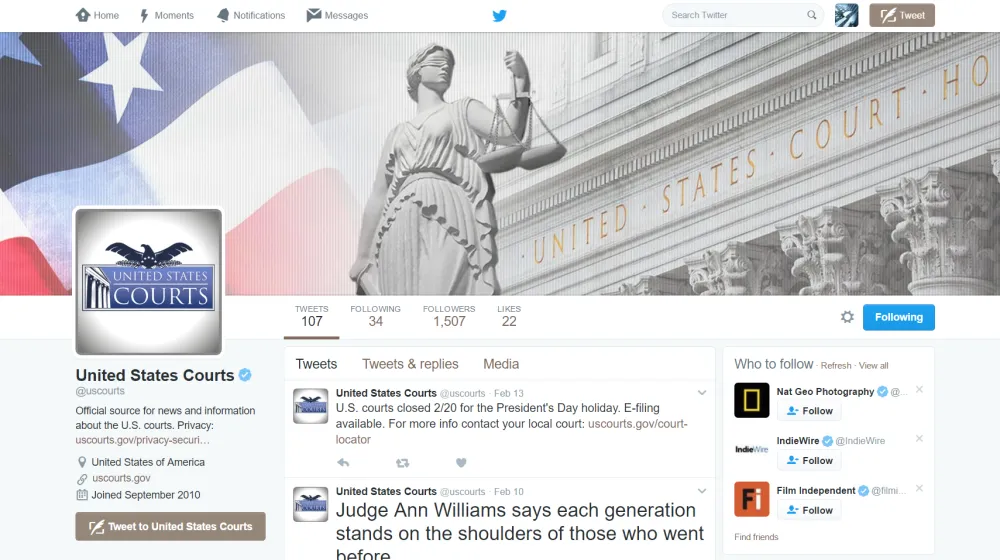Federal judges and court staff conducted a variety of public outreach efforts with the goal of bringing greater understanding to the role of the Judiciary in American democracy.
Emphasizing the Courts’ Role in Civic Life
The Judiciary’s outreach efforts included programs that can be adapted by judges, court staff, and teachers to teach the fundamentals of the U.S. court system. In 2016, Administrative Office (AO) designed, courtroom-ready activities included an interactive activity marking the 50th anniversary of Miranda v. Arizona. In this activity, participants applied the precedent established in the landmark case to a contemporary scenario involving young people. The You Be the Judge series of sentencing exercises is another new and interactive courtroom program presided over by federal judges and coached by volunteer attorneys. It gives participants the experience of making tough, complex decisions like those judges make every day.
For the third annual Judiciary-wide celebration of Constitution Day and Citizenship Day in September, federal judges presided over more than 40 naturalization ceremonies in which schools and community groups participated. The AO livestreamed ceremonies at Ellis Island and the Lincoln Memorial. It also produced a video roundup of ceremonies at other natural and historic sites featured as part of the National Park Service’s 100th anniversary.
Pathways to the Bench Series
In the Pathways to the Bench video series, federal judges talk about the challenges in their lives that prepared them to serve on the bench. In a video produced in 2016, U.S. District Court Judge Lorna G. Schofield, of the New York Southern District, talks about her upbringing as the only child of a single mother from the Philippines. She discusses how, through hard work, perseverance, and her mother’s guidance, she became the first Filipino-American Article III judge.
Digital Services
As part of a multi-year effort to save website startup costs and make court websites easy to navigate, the AO provided a website development toolbox to more than 170 district, appellate, and bankruptcy courts, as well as to Probation and Pretrial Services offices around the country. More than half of these court units also are using the AO’s website hosting service.
The Court Website Toolbox allows courts to create and maintain their own public-facing online presence for little added cost by using AO templates, design elements, content, accessibility tools, and analytics. This approach allows courts to easily provide public access to website content required by statute or by Judicial Conference policy, and ensures a consistent and easy-to-use experience for users. A mobile-friendly version was made available to the courts in 2016.
JNet, the Judiciary’s internal website, was upgraded in 2016 with new tools to make it easier to locate and identify AO employees and services. The Service Finder helps court employees find AO staff by specific areas of service (e.g., budget formulation, human resources policy), while the Office Finder lets users navigate the AO organizational structure to locate desired contacts.

In 2016 the Judiciary also launched a Twitter account, @uscourts, in 2016 as a way of getting court news and information disseminated quickly to the public. The AO uses Twitter to share information that supports the mission of the Third Branch of government and helps make the work of the Judiciary more transparent to a broad audience.
Public Access to Caseload Data
The AO is working to make Judiciary data available in new and more useful ways. Historically, statistical data were published on an annual or quarterly basis through static print reports. To expedite the release of data and save money on printing reports, statistical reports are now made available in PDF format on uscourts.gov. The AO recently made many of the data files available in downloadable Microsoft Excel format. The AO provides hundreds of reports and tables on uscourts.gov.
Annual Report 2016
- Annual Report 2016
- Funding/Budget
- The Courts and Congress
- The Federal Bench in 2016
- Accountability and Resource Management
- Facilities and Security
- Public Outreach
- Court Operations and Case Management
- Defender Services
- Probation and Pretrial Services
- Human Resources
- Information Systems and Cybersecurity
- Recent and Proposed Amendments to the Federal Rules
- In Profile
